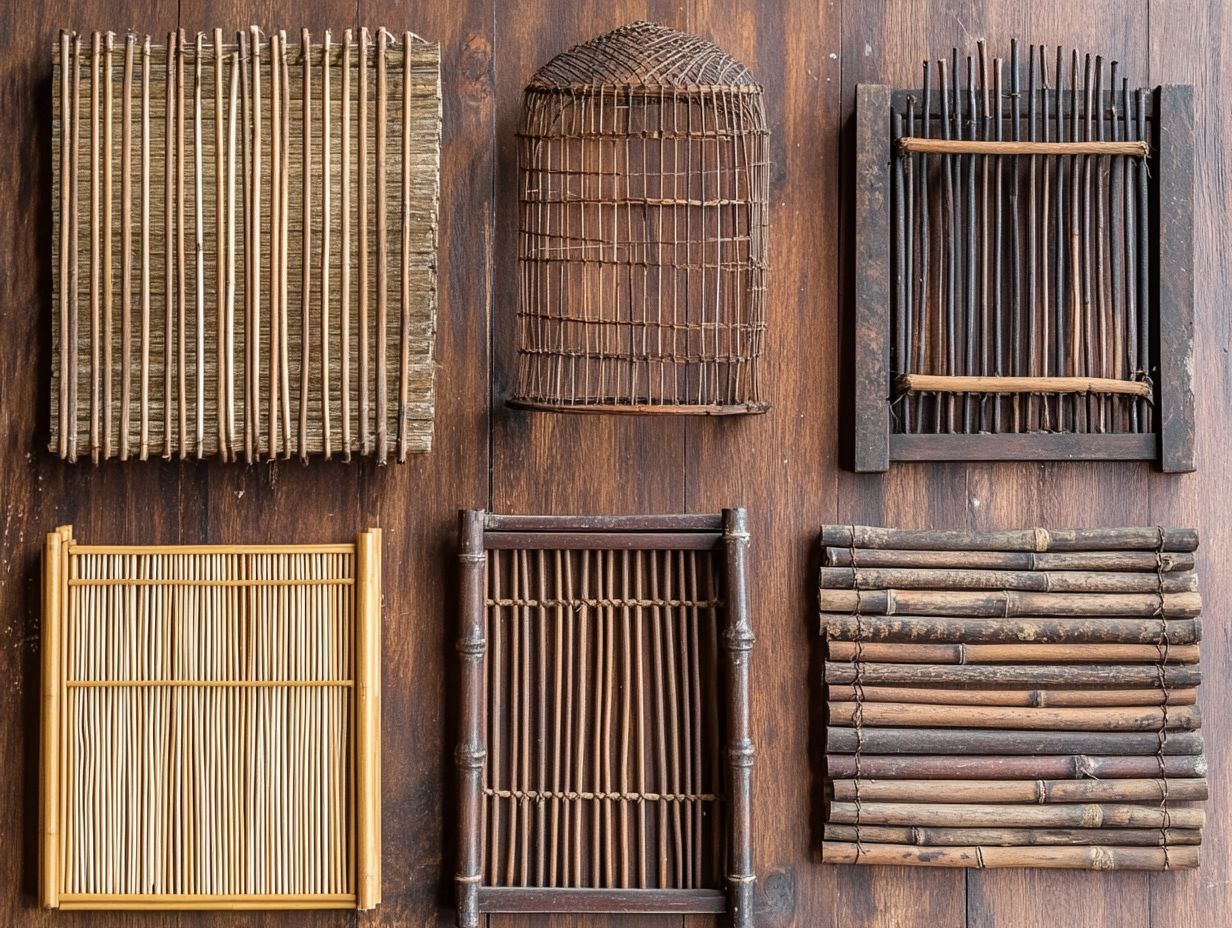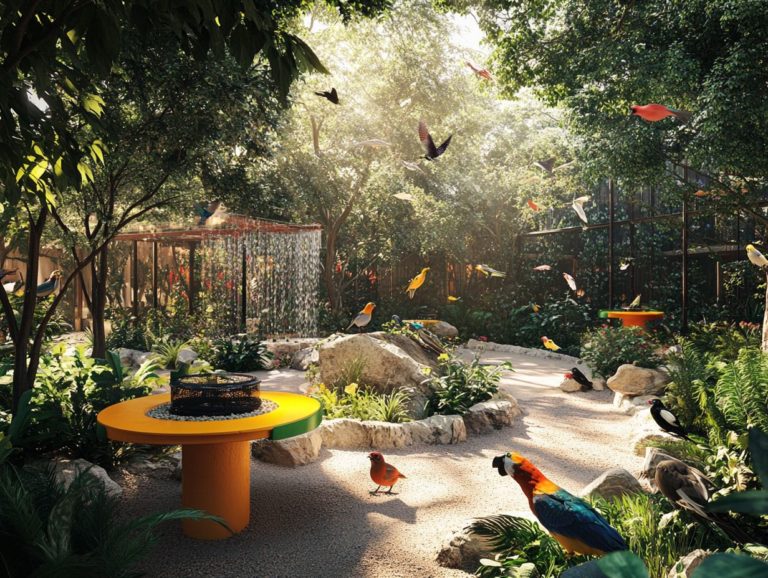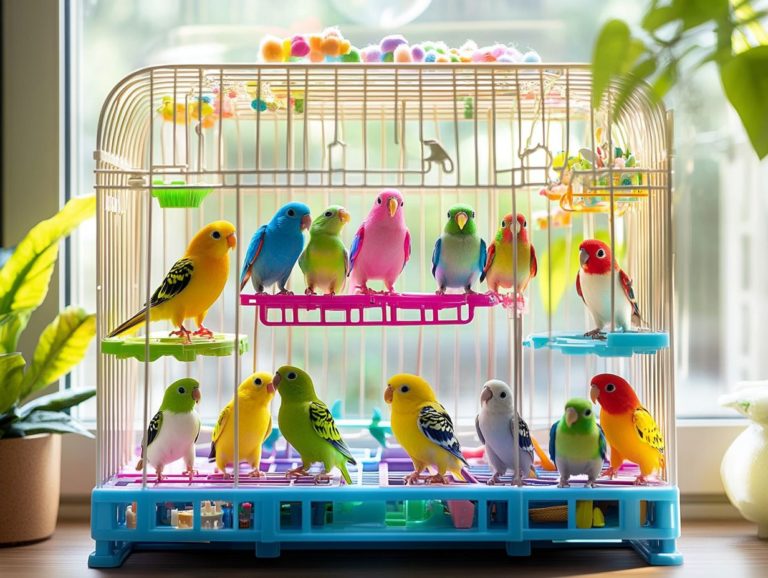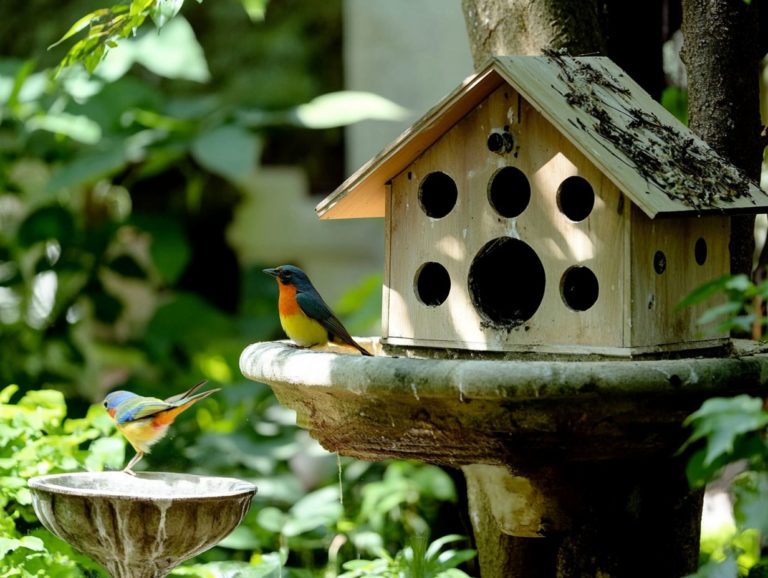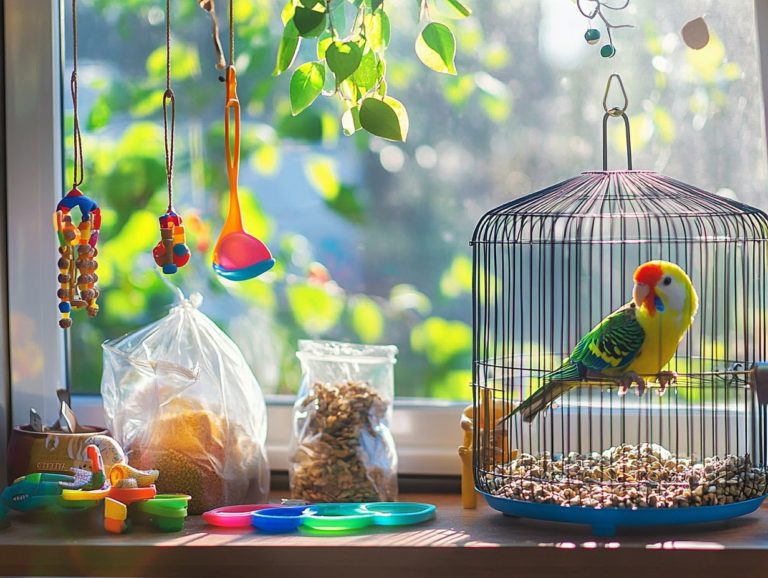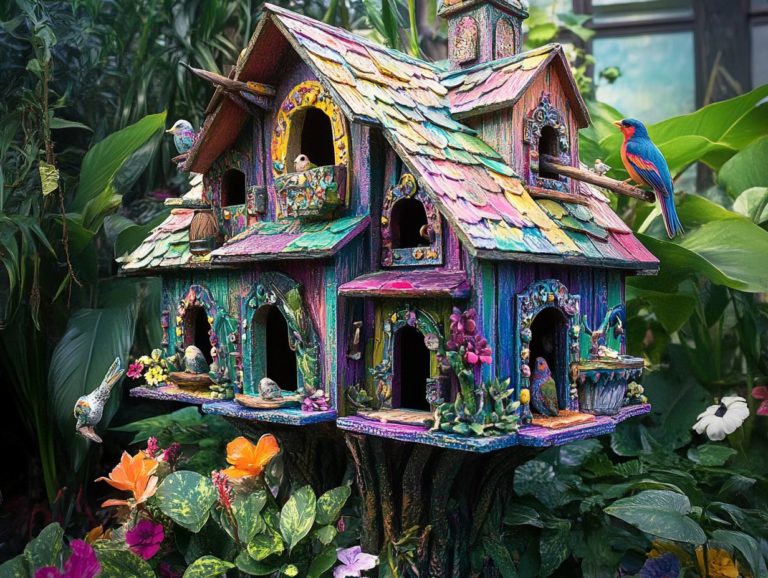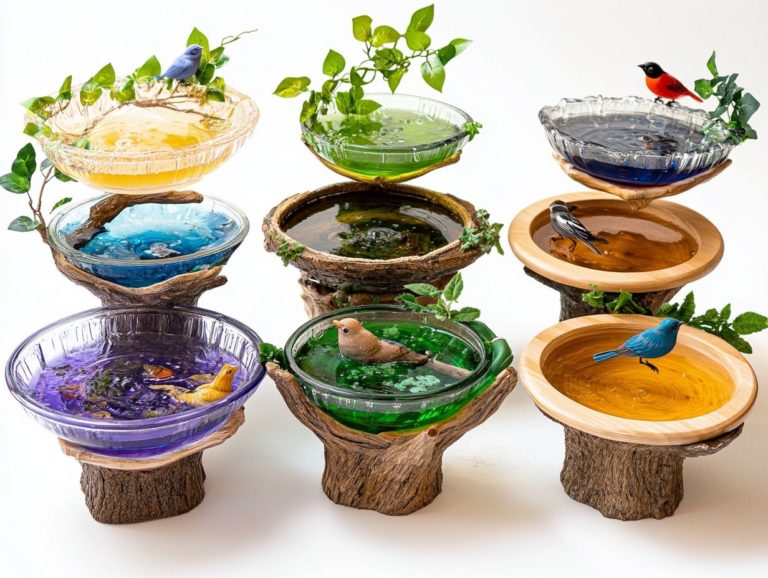Best Materials for Bird Cages
Choosing the right bird cage is essential for your feathered friend’s health and happiness.
Consider factors like size, shape, material, and accessibility; each can significantly influence your bird’s well-being. This article delves into the best materials for bird cages think stainless steel, wrought iron, acrylic, wood, and mesh while laying out the pros and cons of each option.
You ll also find vital tips for maintaining and cleaning your bird’s home to ensure a safe, cozy environment for your pet. Dive in to discover how to make the best choice for your avian companion!
Contents
Key Takeaways:
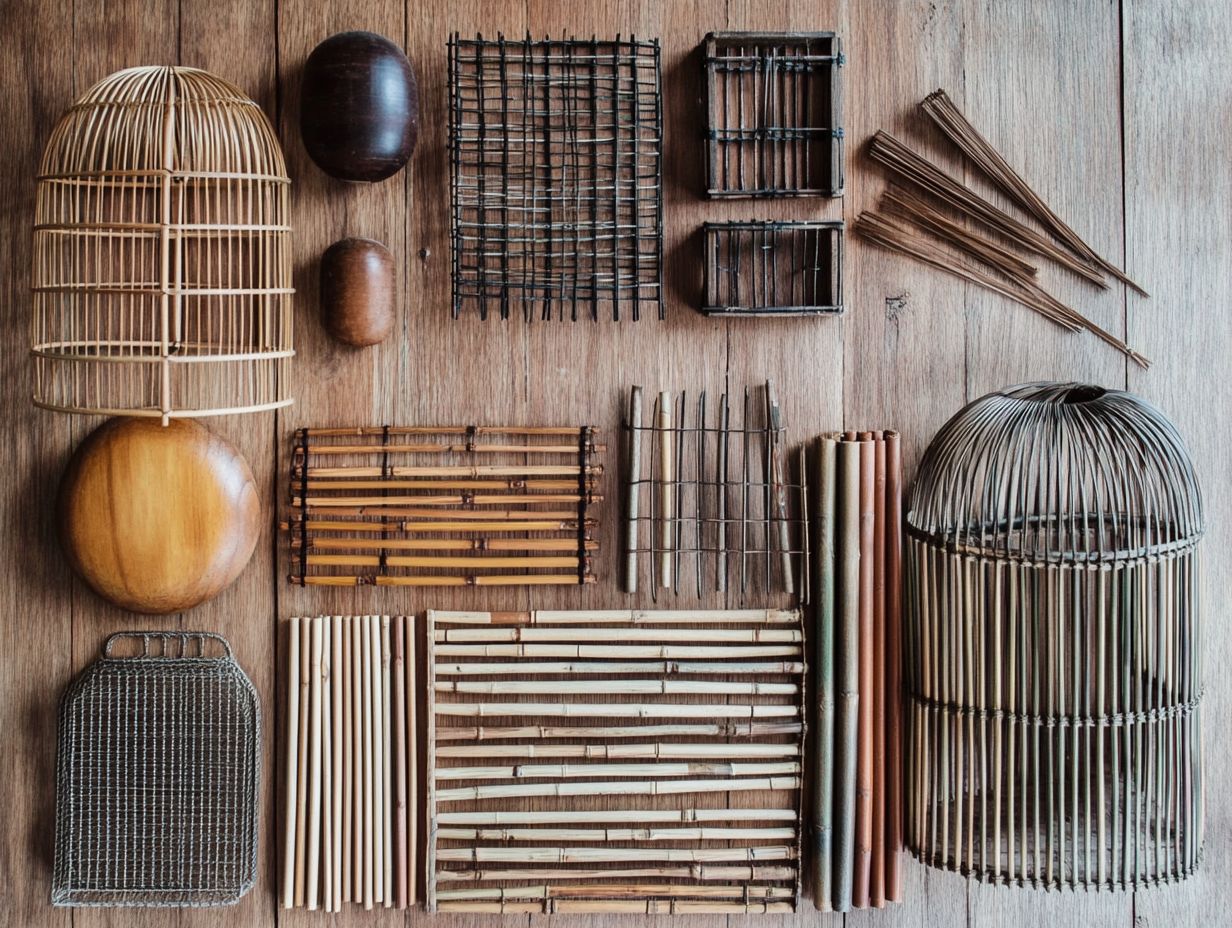
Here are the key takeaways for choosing the perfect bird cage:
- Stainless steel is the top material for bird cages due to its durability, ease of cleaning, and safety.
- Acrylic and wrought iron are good options too, but they may have drawbacks, such as being less durable or having limited ventilation.
- Choose the right size and shape to ensure your bird’s happiness and health!
Factors to Consider When Choosing a Bird Cage
When you re looking for the ideal bird cage for your feathered friends, keep several key factors in mind. Size and shape are crucial, along with the materials used and their durability.
Don’t overlook accessibility and ease of maintenance! Each of these elements plays a vital role in ensuring your birds thrive and are content, especially for exotic species like parrots, macaws, and cockatoos.
Invest in a thoughtfully designed cage that meets their unique needs while also simplifying your cleaning routine and minimizing mess.
Size and Shape
The size and shape of a bird cage significantly impact the well-being and behavior of your pet birds. This is especially true for larger exotic species like macaws and cockatoos, which thrive in spacious environments that allow for movement, play, and exercise.
Understanding the ideal dimensions for each species is essential, as their needs vary greatly. For example, smaller birds like budgerigars do well in narrower cages that allow them to stretch their wings without feeling confined.
The cage’s shape whether rectangular, round, or even a corner design can greatly influence a bird s comfort and exploration. Proper spacing between the bars of the cage is equally important, ensuring it meets safety standards. This not only prevents escapes but also protects against injuries, creating a secure haven tailored to the unique behaviors of each species.
Material and Durability
Choosing the right material for your bird cage is vital for ensuring both durability and safety. Stainless steel and powder-coated cages are among the top choices for bird owners, prized for their longevity and rust resistance. Additionally, when selecting toys, it’s important to understand how to choose safe materials for bird toys.
Consider alternatives like wrought iron, acrylic, and wood, each offering distinct advantages and disadvantages. Wrought iron is strong and can handle active birds, but be prepared for upkeep to prevent rust.
Acrylic cages bring a modern look to your space, yet they can scratch easily and might not provide adequate ventilation if not designed thoughtfully.
Wood offers a natural and visually appealing option, but it may harbor bacteria. Ensure it’s finished with non-toxic materials those that are safe for your bird.
No matter which material you choose, applying non-toxic coatings is crucial for maintaining a healthy habitat, protecting your feathered friends from harmful chemicals that could jeopardize their well-being.
Accessibility and Maintenance
When choosing a bird cage, consider accessibility and maintenance as pivotal factors. A well-constructed cage will facilitate easy cleaning and management of any bird mess, ensuring a hygienic environment for your beloved pets.
Features like trays that can be taken out easily, easy-access doors, and strategically placed perches and toys are essential for crafting an inviting habitat. Removable trays simplify waste disposal. Access doors allow for effortless interaction and feeding. Thoughtfully positioned perches and toys keep your birds entertained and encourage their natural behaviors.
To maintain hygiene and avert health issues, establishing a regular cleaning schedule is advisable. This schedule might include:
- Daily spot checks
- Weekly thorough cleans
- Monthly deep cleans
By committing to this routine, you ensure that your feathered friends thrive in a safe and healthy environment.
Top Materials for Bird Cages
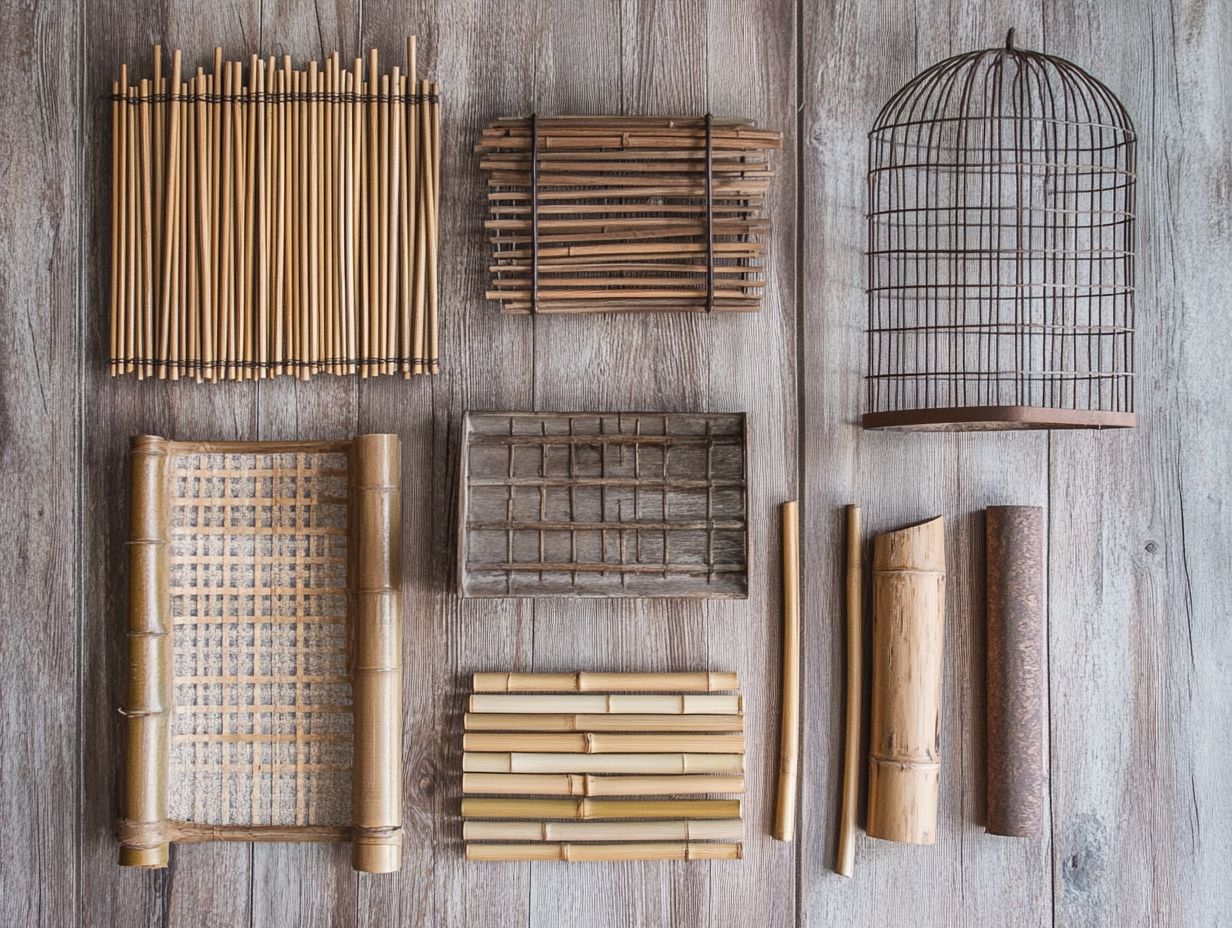
When choosing a bird cage, the materials you select are of utmost importance. Options like stainless steel, wrought iron, acrylic, wood, and mesh each offer distinct advantages, catering to the specific needs of your feathered companions. For more information, check out this guide on how to choose safe materials for bird cages, whether they be parrots, cockatoos, or budgies.
Stainless Steel
Stainless steel, especially 304 Grade Steel, stands out as one of the finest materials for bird cages. Its unmatched durability, rust resistance, and overall safety make it an ideal choice for even the most delicate pet birds. For those looking to provide the best housing options, exploring the best lightweight cages for birds can be beneficial.
This high-quality material offers a longer lifespan compared to other cage types and features an easy-to-clean surface, making maintenance effortless for you as a bird owner. Regular cleaning is vital in minimizing bacteria buildup, fostering a healthier environment for your feathered companions.
Stainless steel cages are crafted with your birds’ comfort and safety in mind, which is crucial for their overall well-being.
You might hesitate at the higher price tag of these premium cages, but many find that it’s a wise investment in the long run. The reduced need for replacements and the superior living conditions they offer make it a choice worth considering.
Wrought Iron
Wrought iron cages are a favored choice among bird owners, celebrated for their strength and aesthetic allure. Often finished with a powder coating, these cages enhance durability and protect against rust and wear.
You’ll love the timeless elegance of these cages, as they frequently feature intricate designs that seamlessly complement any home decor. However, weight is an important consideration; wrought iron cages are generally heavier than their stainless steel counterparts, making them less portable.
Regular maintenance is essential to prevent chipping in the finish, as this can expose the metal to potential corrosion. While stainless steel cages are known for being lightweight and easy to maintain, they may lack the same level of customization or classic charm.
For discerning bird owners, this balance between functionality and beauty can be a critical factor in their decision-making process.
Acrylic
Acrylic bird cages present an attractive alternative that combines excellent visibility with a lightweight design. This makes them a breeze to move and seamlessly integrate into your home decor, providing a safe haven for your feathered companions.
This clever design simplifies cleaning and maintenance while fostering an inviting atmosphere for both you and your birds. With the ability to observe your pets from various angles, you can enjoy a unique perspective on their behaviors and antics, deepening your bond with them.
Remember, these visually stunning cages are a fantastic choice that will bring joy to both you and your feathered friends! However, it s essential to keep in mind that while these cages are visually stunning, they can be susceptible to scratches that might diminish their charm over time. Striking a balance between these advantages and potential drawbacks is vital to ensure a positive experience for both you and your avian friends.
Choose the right cage and watch your birds thrive in happiness!
Wood
Wooden bird cages present a unique aesthetic that can be tailored to reflect your personal style. This creates a warm, inviting environment for your pet birds while ensuring their safety and comfort.
These cages elevate the overall decor of your living space. They also offer various design elements that showcase your individual taste. While the allure of wood is undeniable, potential maintenance challenges should be acknowledged. Regular cleaning and sealing may be necessary to prevent wear and tear over time.
Choose the right wood and finishes to keep your birds safe and happy! Selecting safe materials ensures that your birds thrive in a healthy environment. This way, you can fully appreciate the visual elegance of your wooden cage while enjoying peace of mind knowing your feathered friends are secure.
Mesh
Mesh bird cages offer exceptional ventilation, making them perfect for birds that thrive in a breezy environment. However, ensure the mesh is sized correctly to prioritize your birds’ safety.
The design of these cages boosts visibility for both the birds and their owners, fostering a more interactive experience. Unlike traditional wooden or plastic cages that can stifle airflow and limit sightlines, mesh structures create an open atmosphere that encourages healthy behaviors and social interaction among your feathered friends.
However, there are potential drawbacks to consider, such as the need for regular maintenance to prevent wear and tear. Choose cages with appropriately sized mesh holes to prevent small feet or heads from getting trapped. Ensure the construction is strong enough to handle any pecking or chewing from your birds.
Pros and Cons of Each Material
Understanding the pros and cons of various materials used in bird cages is crucial for making an informed decision. Additionally, selecting the best types of perches for bird cages directly impacts your pet bird’s safety, comfort, and overall well-being.
Strengths and Limitations
Each material you choose for a bird cage has its unique strengths and limitations. These influence not just the aesthetic appeal but also the durability and safety of the cage for your beloved pet birds, especially when considering the best bird cages for large parrots.
Your selection of materials can significantly impact your bird’s living environment and overall well-being. For example, stainless steel stands out with its exceptional durability and rust resistance. It’s a long-lasting option that requires minimal upkeep.
On the other hand, wrought iron offers a timeless aesthetic that many find visually appealing. However, it can be prone to rusting without proper care. Then there’s acrylic, which provides clear visibility for easy observation of your feathered companions. Just be mindful that its surface can be susceptible to scratches.
As a bird owner, weigh these factors carefully when choosing a cage. Opting for stainless steel for outdoor use helps you avoid rust, while protective coatings on wrought iron can enhance its longevity.
Tips for Maintaining and Cleaning Bird Cages
Establishing a routine cleaning schedule is essential for creating a healthy environment for your pet birds. Regular maintenance minimizes mess, enhances hygiene, and supports overall bird health.
By committing to this practice, you ensure your feathered friends thrive in their living space.
Best Practices for Longevity and Hygiene
Implementing best practices for cage longevity and hygiene is essential for ensuring a safe living environment for your pet birds while minimizing the mess that can disrupt the harmony of your home.
To achieve this, consider using removable trays for easy waste disposal. This allows you to maintain cleanliness without hassle. Selecting the right cleaning materials is just as important; opting for safe disinfectants will protect the delicate respiratory systems of your feathered companions.
Establishing regular maintenance routines, ideally on a consistent schedule, helps prevent waste build-up that can lead to unpleasant odors and health risks. A clean and well-maintained cage supports your birds’ well-being while fostering a serene atmosphere in your home.
Frequently Asked Questions
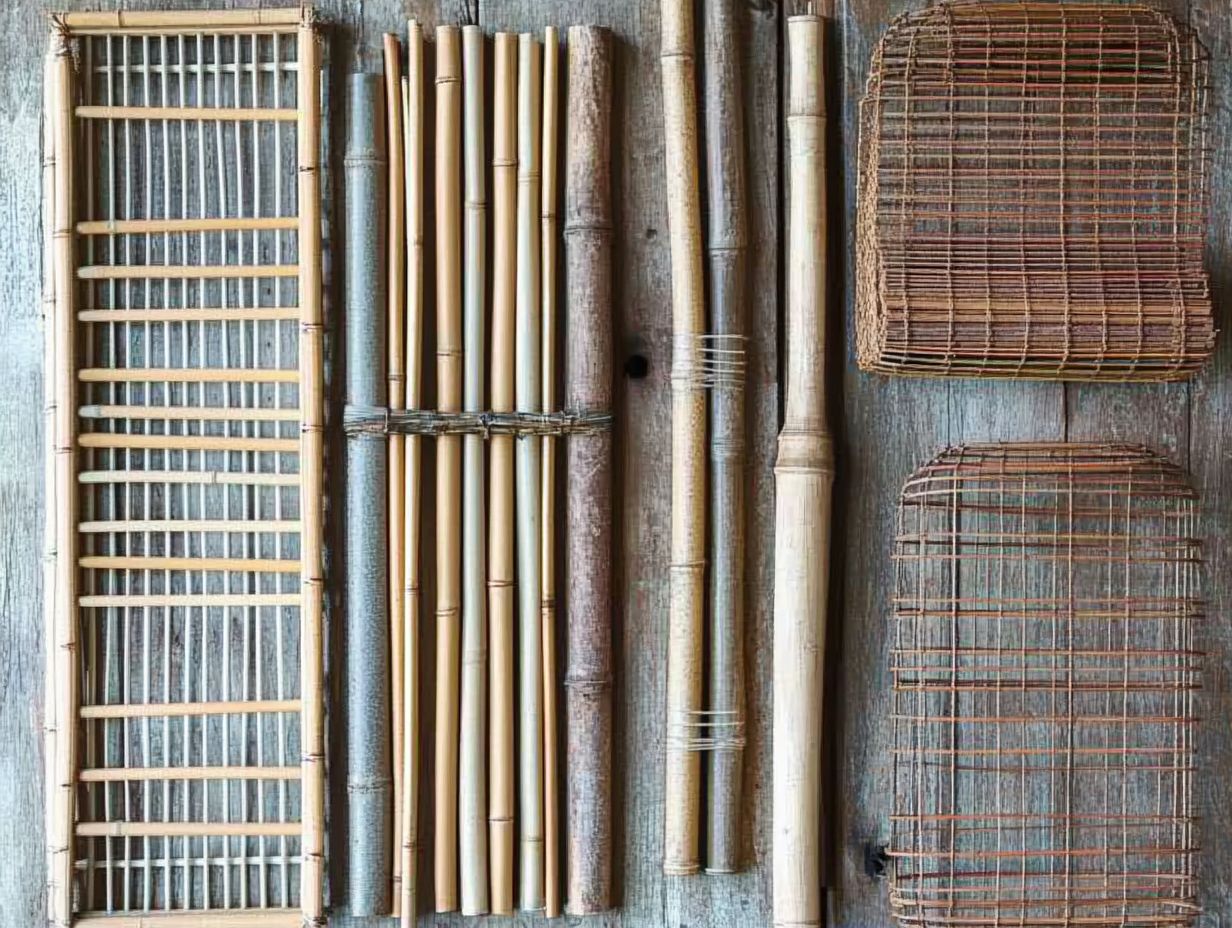
What are the best materials for bird cages?
Stainless steel, wrought iron, and powder-coated steel are the best materials. They last long, are easy to clean, and keep your birds safe.
Why is stainless steel a good choice for bird cages?
Stainless steel is non-toxic and rust-resistant. Plus, it s easy to clean and looks modern!
Are wooden bird cages a good choice?
No, wooden cages can collect germs and are hard to clean. Birds can also chew through them easily.
What is the benefit of using wrought iron for bird cages?
Wrought iron is strong and durable. It’s easy to clean and doesn’t rust, making it a smart investment for bird owners.
Is powder-coated steel safe for birds?
Yes! Just make sure the coating is non-toxic. It s a budget-friendly option that works well for bird cages.
What materials should be avoided for bird cages?
Avoid plastic, bamboo, and galvanized metal. These can harm birds and aren t as durable as stainless steel or wrought iron.

